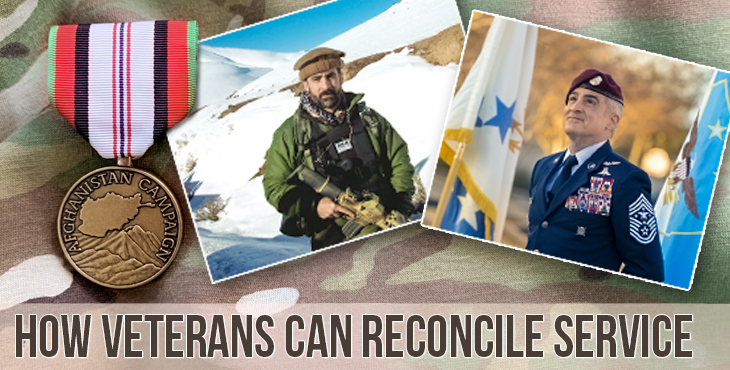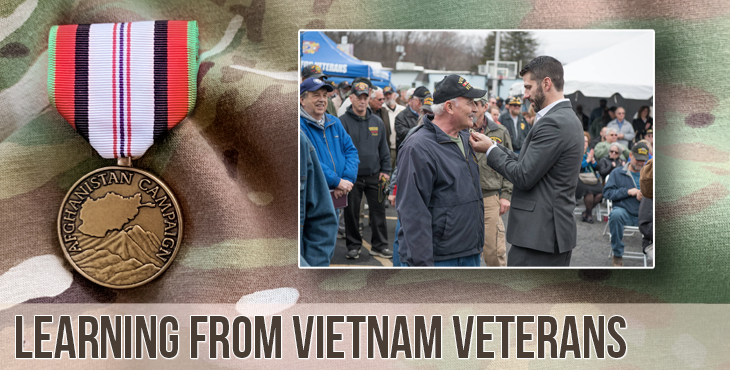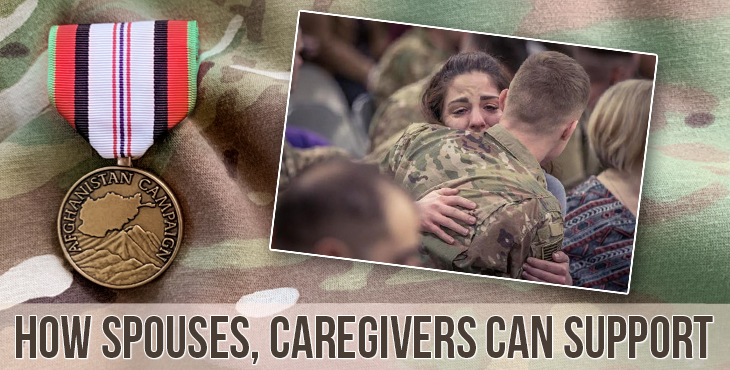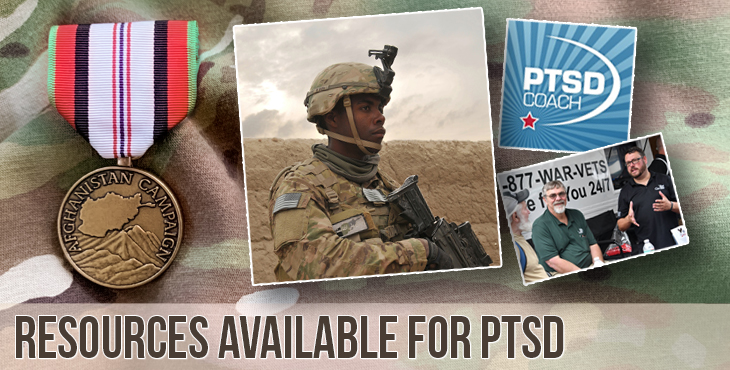This is a four-part series about Afghanistan Veterans and how they can get help through VA. The first part discusses how Veterans can reconcile their service. The second part of this series focuses on how those who served in Afghanistan can learn from those who served in Vietnam. The third part of this series focuses on spouses and caregivers, who are often on the front lines of helping a Veteran deal with posttraumatic stress disorder, or PTSD. Finally, the last part of this series focuses on resources available for PTSD. While this series is focused on Afghanistan Veterans, options apply to all Veterans. We’re publishing one part of the series on each Tuesday of the month of August 2021.
Reconciling Service
“Our purpose for being there was to prevent further attacks on the homeland,” said Senior Enlisted Advisor to the Chairman Ramón “CZ” Colón-López. “We wanted to make sure that we denied Al Qaeda, specifically, of sanctuary, training ground and places where they could plan terrorism attacks. If you look at the past 20 years, that is exactly what we did. There hasn’t been a single attack on the homeland. They will think twice about doing it because of our actions over the past 20 years. For our Veterans, be proud of what you did, because you have kept the country safe over the last 20 years.”
Learning from Vietnam Veterans
“I’ve got Vietnam Veterans who are still coming here, not because we failed to resolve any issue in their life, but because they found a home in the community,” said Joe Lasky, director of the Las Vegas Vet Center. “They found friendships and a way to come talk and deal with issues that may have started in Vietnam, but now affect their current health. Because Vet Centers are readjustment counseling, that’s defined by every Veteran who comes in here.”
Spouses and caregivers supporting Veterans with PTSD
Senior Enlisted Advisor to the Chairman Ramón “CZ” Colón-López was one of those who deployed to Afghanistan. He battled PTSD for years before his wife, Janet, helped him realize he needed treatment. He said he’s proof that a spouse or caregiver can help a Veteran.
“Don’t let us get away with it,” he said. “Do what Janet did and push us to get help. Hell, drive us to the damn clinic. Do yourself a favor and go ahead and make sure you seek the help that you need.”
Resources
“We don’t think twice about putting weapon systems in maintenance because we need them,” Colón-López said. “We run quality control checks on everything. But the one decisive advantage we have as a U.S. military is the human weapon system. This is no different, so we need to make sure we take care of everything that we can right now as we draw down in Afghanistan. This is our depot maintenance period.”
VA Resources
- Vet Centers – Discuss how you feel with other Veterans in these community-based counseling centers. 70% of Vet Center staff are Veterans. Call 1-877-927-8387 or find one near you.
- Veterans Crisis Line – If you are having thoughts of suicide, dial 988 then Press 1, or visit http://www.veteranscrisisline.net/
- For emergency mental health care, you can also go directly to your local VA medical center 24/7 regardless of your discharge status or enrollment in other VA health care.
- VA Women Veterans Call Center – Call or text 1-855-829-6636 (M-F 8AM – 10PM & SAT 8AM – 6:30PM ET)
- VA Caregiver Support Line – Call 1-855-260-3274 (M-F 8AM – 10PM & SAT 8AM – 5PM ET)
- Download VA’s self-help apps – Tools to help deal with common reactions like, stress, sadness, and anxiety. You can also track your symptoms over time.
- VA Mental Health Services Guide – This guide will help you sign up and access mental health services.
- MakeTheConnection.net – information, resources, and Veteran to Veteran videos for challenging life events and experiences with mental health issues.
Community Resources
- Vets4Warriors – 1-855-838-8255
- Wounded Warrior Project – Need someone to talk to? Connect with your peers. Call 888.WWP.ALUM (997.2586) or visit https://www.woundedwarriorproject.org/
- Veteran Wellness Alliance – Need help or want to talk? Check In or call:1-630-522-4904 or email: checkin@veteranwellnessalliance.org
- Code of Support 1-571-418-6339 press 1
- Elizabeth Dole Foundation Hidden Heroes – Join the Community or call 202-249-7170
- American Red Cross Military Veteran Caregiver Network – Peer Support and Mentoring or call the Hero Care Network at 1-877-272-7337
- Tragedy Assistance Program for Survivors (TAPS) – Tragedy Assistance Program For Survivors (TAPS) Is Here For You! or call 800-959-TAPS (8277)
- Travis Manion Foundation – 1-215-348-9080 or email info@travismanion.org
- America’s Warrior Partnership 1-866-AWPVETS
- RallyPoint – Talk to other Veterans online. Discuss: What are your feelings as the Taliban reclaim Afghanistan after 20 years of US involvement?
- Together We Served –Find your battle buddies through unit pages
- Team Red, White & Blue – Hundreds of events weekly. Find a chapter in your area.
- Student Veterans of America – Find a campus chapter to connect with.
- Independence Fund
- Blue Star Families
- ETS Sponsorship
- Boulder Crest
- Cohen Veterans Network
- Team Rubicon
Veteran Service Organizations
- The American Legion
- AMVETS
- Disabled American Veterans Charity (DAV)
- Iraq and Afghanistan Veterans of America (IAVA)
Contact them 24/7/365 by calling 855-91RAPID (855-917-2743) or digitally at www.quickreaction force.org
- Veterans of Foreign Wars (VFW)
- Vietnam Veterans of America






